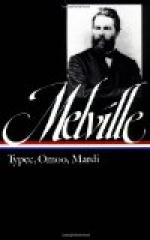And among those calumets, my lord Media’s showed like the turbaned Grand Turk among his Bashaws. It was an extraordinary pipe, be sure; of right royal dimensions. Its mouth-piece an eagle’s beak; its long stem, a bright, red-barked cherry-tree branch, partly covered with a close network of purple dyed porcupine quills; and toward the upper end, streaming with pennons, like a Versailles flag-staff of a coronation day. These pennons were managed by halyards; and after lighting his prince’s pipe, it was little Vee-Vee’s part to run them up toward the mast-head, or mouthpiece, in token that his lord was fairly under weigh.
But Babbalanja’s was of a different sort; an immense, black, serpentine stem of ebony, coiling this way and that, in endless convolutions, like an anaconda round a traveler in Brazil. Smoking this hydra, Babbalanja looked as if playing upon the trombone.
Next, gentle Yoomy’s. Its stem, a slender golden reed, like musical Pan’s; its bowl very merry with tassels.
Lastly, old Mohi the chronicler’s. Its Death’s-head bowl forming its latter end, continually reminding him of his own. Its shank was an ostrich’s leg, some feathers still waving nigh the mouth-piece.
“Here, Vee-Vee! fill me up again,” cried Media, through the blue vapors sweeping round his great gonfalon, like plumed Marshal Ney, waving his baton in the smoke of Waterloo; or thrice gallant Anglesea, crossing his wooden eg mid the reek and rack of the Apsley House banquet.
Vee-Vee obeyed; and quickly, like a howitzer, the pipe-owl was reloaded to the muzzle, and King Media smoked on.
“Ah! this is pleasant indeed,” he cried. “Look, it’s a calm on the waters, and a calm in our hearts, as we inhale these sedative odors.”
“So calm,” said Babbalanja; “the very gods must be smoking now.”
“And thus,” said Media, “we demi-gods hereafter shall cross-legged sit, and smoke out our eternities. Ah, what a glorious puff! Mortals, methinks these pipe-bowls of ours must be petrifactions of roses, so scented they seem. But, old Mohi, you have smoked this many a long year; doubtless, you know something about their material—the Froth-of-the-Sea they call it, I think—ere my handicraft subjects obtain it, to work into bowls. Tell us the tale.”
“Delighted to do so, my lord,” replied Mohi, slowly disentangling his mouth-piece from the braids of his beard. “I have devoted much time and attention to the study of pipe-bowls, and groped among many learned authorities, to reconcile the clashing opinions concerning the origin of the so-called Farnoo, or Froth-of-the-Sea.”
“Well, then, my old centenarian, give us the result of your investigations. But smoke away: a word and a puff go on.”
“May it please you, then, my right worshipful lord, this Farnoo is an unctuous, argillaceous substance; in its natural state, soft, malleable, and easily worked as the cornelian-red clay from the famous pipe-quarries of the wild tribes to the North. But though mostly found buried in terra-firma, especially in the isles toward the East, this Farnoo, my lord, is sometimes thrown up by the ocean; in seasons of high sea, being plentifully found on the reefs. But, my lord, like amber, the precise nature and origin of this Farnoo are points widely mooted.”




